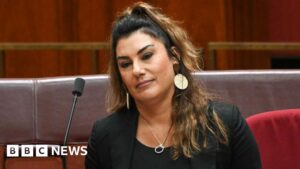Archbishop of Canterbury reveals ancestral links to slavery | Slavery
Justin Welby, the archbishop of Canterbury, has revealed that his ancestor owned enslaved people on a plantation in Jamaica and was compensated by the British government when slavery was abolished.
Welby disclosed his ancestral links in a personal statement that reiterated his commitment to addressing the enduring and damaging legacies of transatlantic slavery.
The archbishop, who is the leader of the global Anglican church, said he discovered recently that his late biological father, Sir Anthony Montague Browne, a private secretary to Winston Churchill, “had an ancestral connection to the enslavement of people in Jamaica and Tobago”.
In 2016, Welby learned that he had been conceived as the result of a brief fling between his mother and Browne, and that Gavin Welby, whom she married shortly afterwards, was not his biological father. Justin Welby had no relationship with Browne, who died in 2013.
According to the archbishop’s statement, Browne was the great great grandson of Sir James Fergusson, the fourth Baronet of Kilkerran and the owner of enslaved people at the Rozelle plantation in St Thomas.
Fergusson, who died in 1838, received part of a £20m compensation package from the British government for the loss of “property” after slavery was abolished.
The Centre for the Study of the Legacies of British Slavery says the Rozelle plantation had about 200 enslaved people working on it at its height, and the Fergusson family shared compensation of £3,591 in 1836 – estimated at more than £3m today.
Welby did not receive any money from Browne while he was alive or from his estate after he died.
The archbishop has been at the forefront of the public acknowledgement by the Church of England (C of E) of its historical benefit from transatlantic slavery.
In a report published last year, the church traced the origins of its £9bn endowment fund partly to Queen Anne’s Bounty, a financial scheme established in 1704 based on transatlantic chattel slavery.
At the time, Welby said: “I am deeply sorry for these links. It is now time to take action to address our shameful past.”
The church has pledged £100m to address the legacy of enslavement. It said later it aimed to grow this to £1bn with contributions from co-investors after a report from an oversight group, chaired by Bishop Rosemarie Mallett, said the original amount pledged was not enough.
In Tuesday’s statement, the archbishop reiterated the C of E’s commitment to a “thorough and accurate research programme, in the knowledge that archives have far more to tell us about what has come before us – often in a very personal way”.
He said: “While I sadly only discovered my relationship to Sir Anthony in 2016, three years after his death, I did have the delight of meeting my half-sister and her son.”
after newsletter promotion
The truth about his biological father came to light after Welby took a DNA test, which showed a 99.98% probability that he was Browne’s son. His mother, Jane, who died last year, said the revelation had “come as an almost unbelievable shock”.
Sir Adam Fergusson, the 10th baronet, said on behalf of the Fergusson family that its “involvement in slavery is a horrible part of its past”. He said: “The archbishop’s connection with the family is a surprise to us all. It is sobering that, five or six generations on, very large numbers of us will have links, known and unknown, to this terrible phase of our history.”
Alex Renton, another descendant of Fergusson and the author of Blood Legacy – Reckoning with a Family’s Story of Slavery, said he and other relatives had made personal donations towards repair initiatives in Britain and the Caribbean since becoming aware of the family’s history.
Renton has also helped set up the Heirs of Slavery group, which works “to encourage other families enriched by slavery wealth to acknowledge their history, apologise and support campaigns for reparations in Europe and the Caribbean”.
In his statement, Welby referred to his trip to Jamaica in July, when he received an honorary degree from the University of the West Indies and apologised to Jamaicans for the church’s role in the enslavement of their ancestors.
He was quoted in the Jamaica Observer saying: “I cannot speak for the government of the United Kingdom but I can speak from my own heart and represent what we say now in England. We are deeply, deeply, deeply sorry. We sinned against your ancestors. I would give anything that that can be reversed, but it cannot.”
The news about Welby’s ancestor comes amid growing pressure on Keir Starmer to address reparatory justice when he travels to Samoa this week to attend the Commonwealth heads of government meeting. There has been speculation about whether or not reparations will be on the agenda, with the UK government ruling out issuing an apology at the summit.
#Archbishop #Canterbury #reveals #ancestral #links #slavery #Slavery
News plays a pivotal role in our lives by keeping us informed and connected to the world. It serves as a critical source of information, offering updates on current events, politics, economics, science, and more. Through news, we gain awareness of global issues and local developments, helping us make informed decisions in our personal and professional lives. News also fosters discussion and debate, encouraging critical thinking and perspective-taking. Moreover, it promotes transparency and accountability among governments, businesses, and other institutions. In a rapidly changing world, staying updated with the news enables us to adapt to new challenges and opportunities, shaping our understanding of the complexities of society. Ultimately, news is not just about information; it empowers us to participate actively in the world around us, contributing to a more informed, engaged, and responsible global citizenry.
Health is fundamental to our well-being and quality of life, making it an essential aspect of daily existence. It encompasses physical, mental, and emotional aspects, influencing our ability to function effectively and enjoy life fully. Prioritizing health allows individuals to maintain optimal physical fitness, reducing the risk of diseases and promoting longevity. Mental health, equally crucial, affects our cognitive abilities, emotional stability, and overall happiness. Investing in preventive healthcare through exercise, balanced nutrition, and regular medical check-ups helps in early detection of potential health issues, ensuring timely intervention and treatment. Beyond individual benefits, a population’s health impacts societal productivity and economic stability. Governments and organizations worldwide emphasize public health initiatives to address pandemics, health disparities, and promote overall well-being. Ultimately, health serves as the foundation upon which we build our lives, influencing our ability to pursue goals, nurture relationships, and contribute meaningfully to society.
Money plays a crucial role in our lives as a means of financial security and freedom. It enables us to meet basic needs such as food, shelter, and healthcare, while also providing opportunities for education, travel, and personal growth. Beyond material comforts, money facilitates social connections and experiences that enrich our lives. It empowers individuals to invest in their futures, whether through savings, investments, or entrepreneurial ventures, thereby fostering economic stability and growth. However, the pursuit of wealth should also be balanced with ethical considerations, as money can influence relationships and societal dynamics. Responsible management of finances is key to achieving long-term goals and mitigating financial stress. Ultimately, while money is a tool for achieving aspirations and fulfilling desires, its true value lies in how it is utilized to improve both personal well-being and the broader community.
Earning Easy Money in 2024: Opportunities and Considerations 💸
In 2024, the landscape of earning easy money presents diverse opportunities, albeit with considerations. The digital age offers platforms for freelancing, online trading, and e-commerce, allowing individuals to leverage skills and creativity for financial gain. Cryptocurrency investments continue to allure with potential for quick profits, yet they entail high volatility and risk. Moreover, the rise of the gig economy enables flexible work arrangements through apps and websites, offering quick payouts but often without job security or benefits. Passive income streams such as rental properties and investments in stocks or bonds remain viable, but demand initial capital and ongoing management. Amid these options, caution is essential to avoid scams and unsustainable ventures promising overnight success. Ultimately, while the allure of easy money persists, informed decisions, diligence, and a long-term perspective are crucial for sustainable financial growth and security in the dynamic year ahead.





